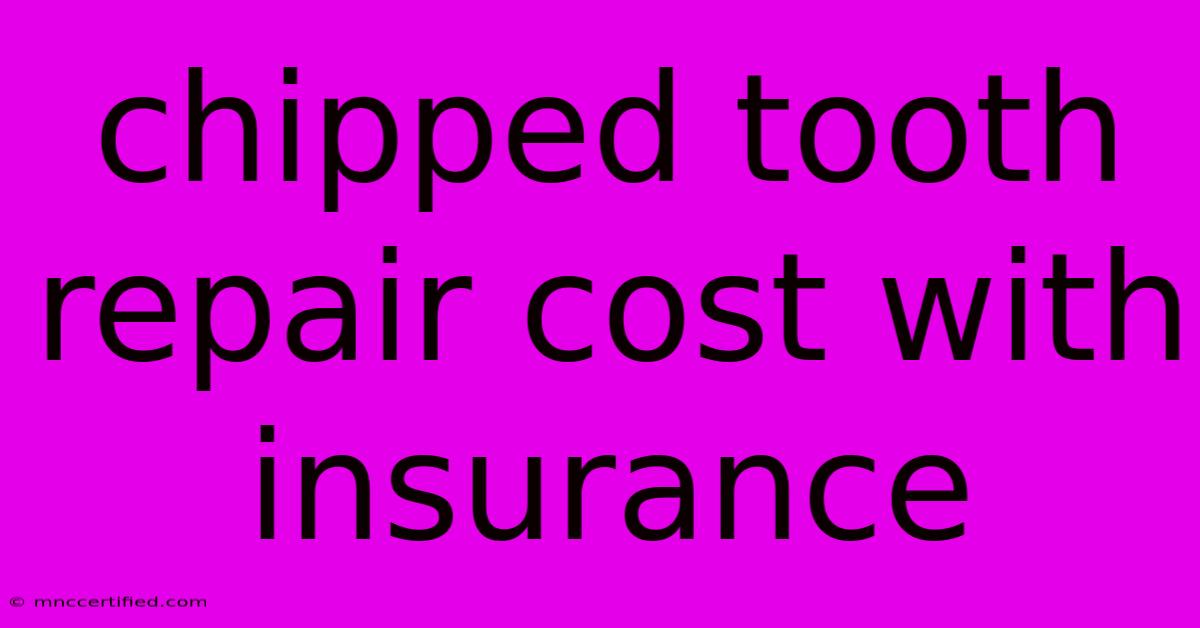Chipped Tooth Repair Cost With Insurance

Table of Contents
Chipped Tooth Repair Cost: What to Expect with Insurance
A chipped tooth can be a painful and embarrassing experience. Fortunately, there are a variety of treatments available to repair the damage and restore your smile. But how much will it cost? And how will insurance coverage affect the final price tag? Let's break down the cost of chipped tooth repair, taking insurance into account.
Understanding Chipped Tooth Repair Costs
The cost of repairing a chipped tooth can vary significantly depending on several factors, including:
- Severity of the chip: A small, superficial chip might only require a simple bonding procedure, while a larger, deeper chip may necessitate a more complex crown or veneer.
- Location of the chip: Chips on front teeth are often more visible and may require more extensive repairs.
- Material used: Different restorative materials, like porcelain, composite resin, or gold, have varying costs.
- Your location: Dental costs can vary from state to state and even within a city.
Here's a general idea of costs for common chipped tooth repair methods:
- Dental Bonding: $100-$400 per tooth
- Dental Veneers: $800-$1,500 per tooth
- Dental Crowns: $800-$2,000 per tooth
The Role of Dental Insurance
Dental insurance plans vary widely in coverage and benefits. Understanding your insurance policy is crucial to getting the best value for your chipped tooth repair. Here's what you need to know:
- Coverage: Most dental plans offer some coverage for chipped tooth repair, but the amount can be limited.
- Deductibles: Before your insurance kicks in, you'll typically need to pay a deductible, which can range from $50 to $200.
- Co-pays: You may be responsible for a co-pay for each dental procedure, typically a percentage of the total cost.
- Waiting Periods: Some plans have waiting periods before certain procedures are covered.
- Maximum Benefits: Dental plans often have annual or lifetime maximums on benefits.
Tips for Managing Chipped Tooth Repair Costs
Here are a few tips to minimize out-of-pocket costs:
- Check Your Coverage: Review your dental insurance plan carefully to understand your benefits and limitations.
- Consider a Dental Savings Account (DSA): DSAs allow you to save pre-tax money for dental expenses.
- Ask About Payment Plans: Many dentists offer flexible payment plans to make treatment more affordable.
- Shop Around: Get quotes from multiple dentists to compare pricing and services.
- Consider Alternatives: In some cases, less expensive alternatives like dental bonding may be suitable.
When to Seek Professional Help
If you've chipped a tooth, it's important to see a dentist promptly. They can assess the damage, recommend the best treatment option, and help you understand the associated costs.
Here are some signs that your chipped tooth requires immediate attention:
- Severe pain
- Bleeding
- Significant sensitivity to hot or cold
- Difficulty chewing
- Loose tooth
Don't delay seeking professional help! A timely visit to your dentist can prevent further damage and ensure a quick recovery.
Remember, the cost of chipped tooth repair can vary. By understanding your insurance coverage and exploring options, you can make informed decisions about treatment and minimize out-of-pocket costs.

Thank you for visiting our website wich cover about Chipped Tooth Repair Cost With Insurance. We hope the information provided has been useful to you. Feel free to contact us if you have any questions or need further assistance. See you next time and dont miss to bookmark.
Featured Posts
-
Health Insurance Giant Nyt Crossword Clue
Nov 07, 2024
-
Orthodontist Visit Cost Without Insurance
Nov 07, 2024
-
Health Insurance Wont Cover Car Accident
Nov 07, 2024
-
University Offers Well Being Support
Nov 07, 2024
-
Lammy Aims To Mend Ties With Trump
Nov 07, 2024